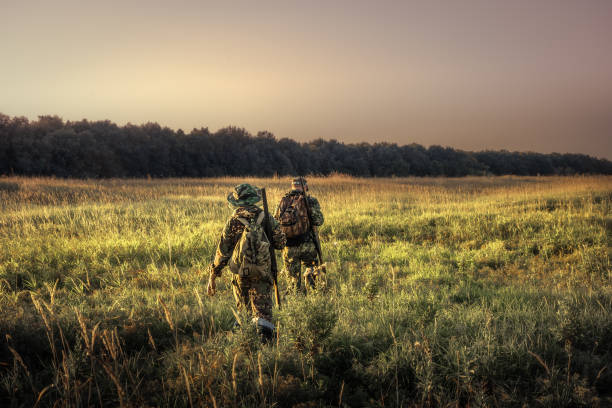The Gunpowder Trail: Preparing for Next Deer Hunting Season

By Derrick R. Stallings – HuntingOfficer.com
With the close of another deer hunting season, the woods may seem quiet, but for the dedicated hunter, it’s a time of reflection, rejuvenation, and preparation for the next year’s pursuit. Now is the perfect opportunity to fine-tune your skills, gear, and strategy to increase your chances of success in the upcoming season.
1. Gear Maintenance and Upgrades:
- Thorough Weapon Cleaning: A clean weapon is a reliable weapon. Disassemble your firearm, clean all components meticulously, and lubricate them according to the manufacturer’s instructions. This ensures optimal performance and extends the life of your firearm.
- Scope and Optic Maintenance: Clean your scope lenses with a high-quality lens cleaning solution and a microfiber cloth. Inspect the scope mounts and rings for any signs of wear or looseness. If necessary, have your scope professionally serviced or calibrated.
- Bow Maintenance: Inspect your bowstring and cables for any signs of fraying or wear. Replace them if necessary. Lubricate moving parts and ensure the bow is tuned and shooting accurately.
- Clothing and Footwear Inspection: Wash and repair any damaged hunting clothing. Replace worn-out boots and invest in new, comfortable footwear for long days in the field. Consider upgrading your base layers for better insulation and moisture-wicking.
- Scent Control: Wash and deodorize all your hunting gear, including backpacks, boots, and gloves. Invest in high-quality scent-eliminating sprays and detergents.
2. Physical and Mental Conditioning:
- Improve Physical Fitness: Deer hunting often requires long periods of standing, walking, and sometimes even running. Engage in regular cardiovascular exercise and strength training to improve your stamina and endurance.
- Enhance Marksmanship: Practice regularly at the range. Focus on improving your accuracy at various distances and in different shooting positions. Consider taking a professional shooting course to refine your technique.
- Develop Scouting Skills: Spend time in the woods, even during the off-season. Learn to identify deer trails, bedding areas, and food sources. Observe wildlife activity and understand how deer behavior changes throughout the year.
- Mental Fortitude: Hunting can be physically and mentally demanding. Practice patience, discipline, and perseverance. Develop a strong mental game to stay focused and motivated even when facing challenges.
3. Scouting and Planning:
- Intensive Scouting: Utilize the off-season to conduct thorough scouting expeditions. Identify potential hunting locations, observe deer activity, and map out travel routes and stand locations.
- Food Source Analysis: Determine the primary food sources available to deer in your area during different seasons. This will help you predict deer movement patterns and plan your hunts accordingly.
- Trail Camera Surveillance: Set up trail cameras in strategic locations to monitor deer activity, identify bucks, and assess the overall deer population. Analyze the images and videos to gain valuable insights into deer behavior and movement patterns.
- Develop a Hunting Plan: Based on your scouting observations and local regulations, create a detailed hunting plan. Determine your hunting dates, locations, and strategies.
4. Skill Enhancement:
- Learn Advanced Hunting Techniques: Explore new hunting methods such as hunting from tree stands, ground blinds, or using decoys. Consider taking a hunting course to learn advanced techniques from experienced hunters.
- Improve Tracking Skills: Practice tracking deer sign, such as tracks, scrapes, and rubs. Develop your ability to interpret these signs to understand deer movement and behavior.
- Learn Game Calls: Invest in quality deer calls and practice using them effectively. Learn to imitate different deer sounds, such as bucks grunting, does bleating, and fawns bawling.
- Sharpen Your Wilderness Survival Skills: Learn basic wilderness survival skills, such as navigation, fire starting, and first aid. These skills can be invaluable in the event of an unexpected situation.
5. Community and Conservation:
- Join a Hunting Club or Organization: Connect with other hunters by joining a local hunting club or organization. Share knowledge, learn from experienced members, and participate in conservation efforts.
- Support Conservation Initiatives: Contribute to organizations that support wildlife conservation and habitat management. Donate to conservation funds or participate in volunteer programs to help protect and enhance deer populations.
- Educate and Mentor Others: Share your knowledge and experience with aspiring hunters. Mentor young hunters and introduce them to the joys and responsibilities of ethical hunting.
6. Rest and Recharge:
- Prioritize Rest and Recovery: Hunting can be physically and mentally demanding. Ensure you get enough rest and prioritize recovery between hunts.
- Enjoy the Off-Season: Spend time outdoors, enjoy nature, and reconnect with the natural world. This will help you stay refreshed and motivated for the upcoming season.
By diligently preparing during the off-season, you can significantly increase your chances of success in the next deer hunting season. Remember, hunting is not just about the kill; it’s about the challenge, the connection with nature, and the opportunity to learn and grow as a sportsman or sportswoman. Embrace the off-season as a time for learning, preparation, and rejuvenation, and may your next hunting season be filled with success and memorable experiences.
Disclaimer: This article provides general information for recreational hunters. Always follow all applicable hunting regulations and safety guidelines.
*AI was used in-part to aid in the creation of this post
Discover more from HuntingOfficer
Subscribe to get the latest posts sent to your email.
